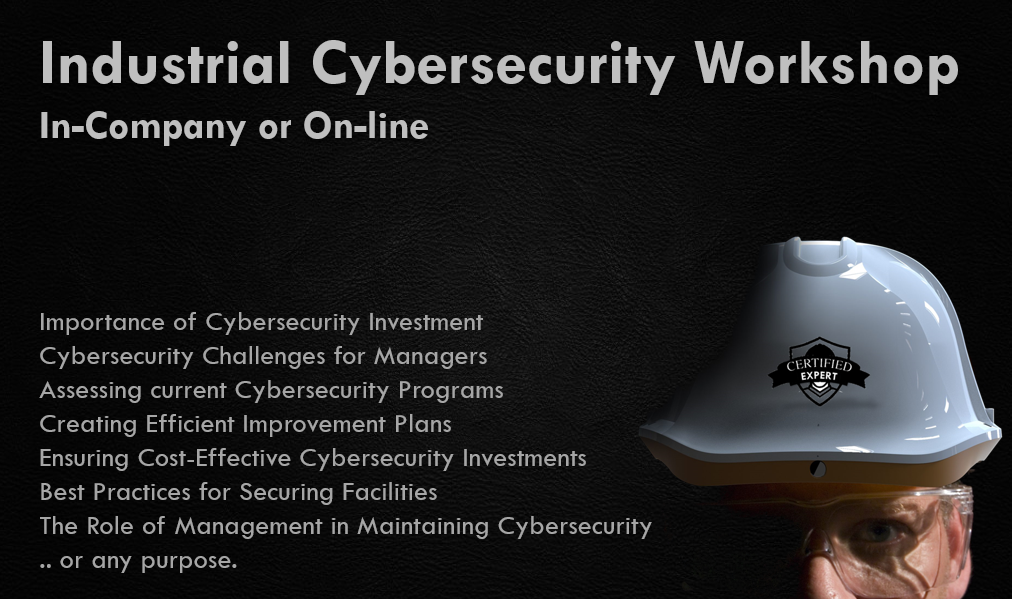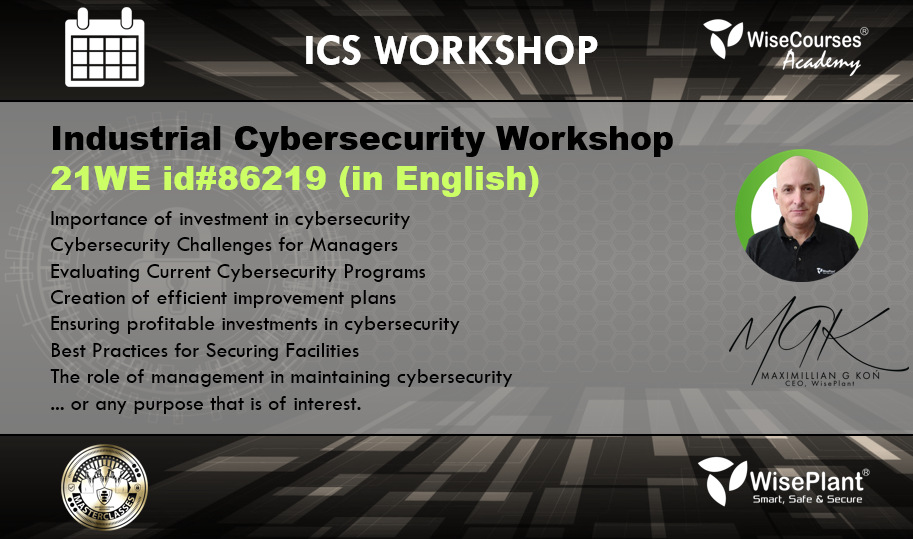We’ve seen the devastating consequences of not taking industrial security seriously. It’s easy to think “that won’t happen to me,” but the truth is, it can happen to anyone. That’s why I highly recommend attending an Industrial Cybersecurity workshop to learn the essential tips and tricks to stay safe and secure in the digital world. The Industrial Cybersecurity workshop is all about it and it provides you with some expert tips for keeping the plant safe and secure. These tips could be the difference between being a victim of cyber-incident and being protected from it.
What is a Cybersecurity Workshop?
A cybersecurity workshop is a training program that is designed to educate managers on how to effectively manage their cybersecurity investments and safeguard their facilities from potential risks.
The workshops offered by WisePlant focus on addressing the specific challenges that managers face when it comes to ensuring the security of their facilities. The aim is to equip participants with the skills necessary to assess cybersecurity programs and create cost-effective improvement plans.
A workshop can be scheduled with a fixed agenda of topics to be discussed, or the participants are free to ask questions to the instructor or SME. The SME will respond to the participants to the best of their knowledge and experience.
Cybersecurity workshops are becoming increasingly important in today’s digital age, as security breaches can have serious consequences for businesses.
The WisePlant Cybersecurity Workshops are specifically designed for managers who are responsible for ensuring the safety and security of their facilities. These workshops help managers understand the importance of cybersecurity investment, identify specific cybersecurity challenges, assess current cybersecurity programs, create efficient improvement plans, ensure cost-effective cybersecurity investments, and implement best practices to secure their facilities.
Here are some benefits of attending a cybersecurity workshop:
Increased knowledge and awareness: Participants will learn about the latest cybersecurity approaches and how to identify potential risks in their facilities. They will also gain a better understanding of the international standards and compliance requirements related to cybersecurity.
Improved risk management: By attending a cybersecurity workshop, managers will learn how to develop a risk management strategy that is tailored to their organization’s specific needs. This approach will help them to identify potential risks and manage them effectively.
Better incident response: One crucial aspect of cybersecurity is being able to respond quickly to security incidents. Participants in cybersecurity workshops will learn how to create an incident response plan that can help minimize the damage and prevent future incidents.
Cost-effective solutions: A cybersecurity workshop will teach participants how to create a robust cybersecurity program that is cost-effective. They will learn how to identify the most critical areas that need improvement and prioritize their investments accordingly.
In summary, attending a cybersecurity workshop can help managers to improve their knowledge and skills when it comes to managing cybersecurity investments. They will learn how to assess cybersecurity programs, identify potential risks and vulnerabilities, and develop cost-effective improvement plans. By being proactive and investing in their cybersecurity infrastructure, organizations can prevent costly security breaches and protect their reputation.
Pro Tips:
- Define the purpose: Before organizing a cybersecurity workshop, it is important to define the purpose of the workshop. Decide on the topic you want to cover, the audience you want to target, and what skills or knowledge you want participants to gain.
- We encourage an interactive approach: A cybersecurity workshop should be interactive or hands-on. Encourage participants to ask questions, participate in discussions, and engage in activities that will help them understand the importance of cybersecurity that satisfy their needs.
- Create a safe learning environment: Participants need to feel comfortable and safe during the cybersecurity workshop. Ensure that there are clear guidelines on what is expected from the workshop and create an environment that encourages active participation and learning.
- Follow-up and evaluation: After the cybersecurity workshop, we follow up with participants to get feedback on what they learned and how they plan to apply that knowledge. The feedback can help to create future workshops, ensure that participants gained the skills and knowledge they need, and provide a tool to measure the effectiveness of your cybersecurity workshop.
Understanding the Importance of Cybersecurity Investment
Investing in cybersecurity is not only critical for protecting critical assets but also for maintaining the integrity of a company’s reputation and operational continuity. Cybersecurity investment ensures that plants are prepared to counter potential risks and that they can mitigate the risks associated with potential cyber-incidents or threats. Moreover, a sound cybersecurity strategy can help organizations comply with regulatory obligations, protect intellectual property, prevent financial losses, and physical damage.
Key points:
- Cybersecurity investment is critical for protecting critical assets and maintaining a company’s reputation.
- Cybersecurity investment helps businesses to counter potential threats and mitigate risks associated with cyber-attacks.
- Sound cybersecurity strategies help organizations to comply with regulatory obligations, protect intellectual property, and prevent financial losses.
Identifying Specific Cybersecurity Challenges for Managers
The WisePlant Cybersecurity Workshops help managers identify specific cybersecurity challenges that they may face in securing their facilities. These challenges can range from lack of awareness about cybersecurity threats to insufficient training and education for employees. Cybersecurity threats can also arise due to unmitigated risk or lack of effective security policies. The workshops are designed to help managers understand the specific industrial cybersecurity challenges they face and equip them with the knowledge and tools to address these challenges.
Key points:
- Cybersecurity challenges can stem from a lack of awareness about cybersecurity risks, insufficient training and education for employees, weakness in the design of the OT infrastructure, and lack of effective security policies.
- WisePlant Cybersecurity Workshops help managers identify specific cybersecurity challenges they face.
- The workshops equip managers with knowledge and tools.
Assessing Current Cybersecurity Programs
Once managers have identified the specific industrial cybersecurity challenges in their facilities, they need to assess their current programs to gauge how effective they are in addressing these challenges. The WisePlant Cybersecurity Workshops include training on how to evaluate cybersecurity programs using established frameworks and methodologies. This training helps managers identify gaps in their cybersecurity programs and make recommendations for improvement.
Key points:
- Managers need to assess their current cybersecurity programs to gauge how effective they are in addressing specific cybersecurity challenges.
- The WisePlant Cybersecurity Workshops include training on how to evaluate cybersecurity programs using established frameworks and methodologies.
- The training helps managers identify gaps in their cybersecurity programs and make recommendations for improvement.
Creating Efficient Improvement Plans
After assessing the effectiveness of their current cybersecurity programs, managers need to create efficient improvement plans that address the identified gaps. The WisePlant Cybersecurity Workshops provide training on how to create cost-effective improvement plans that prioritize the most critical cybersecurity issues. These improvement plans should be achievable, measurable, and should align with the company’s business objectives.
Key points:
- Managers need to create efficient improvement plans that address identified gaps in their cybersecurity programs.
- The WisePlant Cybersecurity Workshops provide training on how to create cost-effective improvement plans that prioritize the most critical cybersecurity issues.
- Improvement plans should be achievable, measurable, and should align with the company’s business objectives.
Ensuring Cost-Effective Cybersecurity Investments
Cost-effectiveness is an important consideration when investing in cybersecurity. The WisePlant Cybersecurity Workshops provide training on how to ensure that cybersecurity investments are cost-effective. This includes identifying the right tools and technologies that provide the most value, using established cybersecurity standards and practices, and considering the long-term impact of cybersecurity investments.
Key points:
- Cost-effectiveness is an important consideration when investing in cybersecurity.
- The WisePlant Cybersecurity Workshops provide training on how to ensure that cybersecurity investments are cost-effective.
- Managers need to consider the long-term impact of cybersecurity investments.
Best Practices for Securing Facilities
The WisePlant Cybersecurity Workshops also provide training on best practices for securing facilities. These include implementing multi-layered security measures, such as firewalls, antivirus software, and intrusion detection systems, as well as creating strong passwords and network access controls. Regular systems and software updates, employee training, and educating customers on cyber threats are also important components of a comprehensive cybersecurity strategy.
Key points:
- Multi-layered security measures, strong passwords, and network access controls are best practices for securing facilities.
- Regular systems and software updates, employee training, and educating customers on cyber threats are also important components of a comprehensive cybersecurity strategy.
- The WisePlant Cybersecurity Workshops provide training on best practices for securing facilities.
The Role of Management in Maintaining Cybersecurity
Lastly, the role of management in maintaining cybersecurity cannot be overstated. It is the responsibility of managers to ensure that their facilities are adequately protected from cyber risks. This includes implementing, maintaining, and updating cybersecurity programs as well as promoting a culture of cybersecurity awareness and responsibility among employees. Managers must also assess the effectiveness of cybersecurity investments periodically and make changes as necessary to ensure the continued efficacy of their cybersecurity programs.
Key points:
- Managers are responsible for ensuring that their facilities are adequately protected from cyber threats.
- Managers must promote a culture of cybersecurity awareness and responsibility among employees.
- The effectiveness of cybersecurity investments must be assessed periodically.
In conclusion, the WisePlant Cybersecurity Workshops provide valuable training and resources that help managers address specific cybersecurity challenges, assess the efficacy of their cybersecurity programs, and create cost-effective improvement plans. These workshops are essential for organizations that want to protect what matters most, maintain the integrity of their reputation, and comply with regulatory obligations. The workshops also provide training on best practices for securing facilities and promote a culture of cybersecurity awareness and responsibility among employees.
Workshop Options:
The workshop can be delivered in-company or virtual. The duration of the workshop may vary depending on the audiencce, the quantity of topics and purpose. Typically these workshops are developed in 8 hours or 16 hours. You can add additional smaller packages of 4 hours within the same session or at a later time.
Contact us to sales@wiseplant.com or create sales ticket here, and will provide a proposal.





